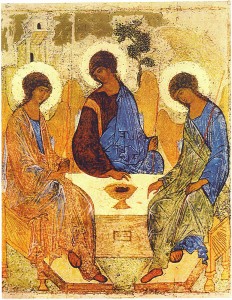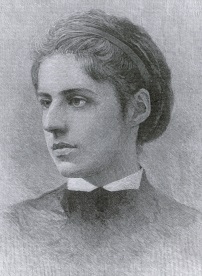“The voice of the LORD is upon the waters;
the God of glory thunders;
the LORD is upon the mighty waters.”
– Psalm 29:3
Beloved of God,
Chilly weather companions our passage from 2016 to 2017. Mini-snow people have spouted on our back lawn, and Kai and Naomi, inspired by the properties of snow and ice, have been on expeditions harvesting sheets of ice from neighborhood puddles and bearing them home, like treasure, on their sled. Watching them brings me back to the days when I did same—with icicles—during long Montana and Minnesota winters. The bigger, the better!
Watching the snow accumulate on the Olympics and Cascades evokes sighs of gratitude within me. In this age of climate breakdown (climate “change” is too benign a term), heavy mountain snows recall the way it’s meant to be. A heavy snowpack plays an essential role within the annual water cycle, and translates into promising prospects for everything and everyone who calls the Northwest bioregion home. Yet, it hasn’t always been that way, as Cynthia Barnett documents in her book, RAIN: A Natural and Cultural History.[1]
“As even tempered as it grew up to be,” she writes, “Earth started off 4.6 billion years ago as a red-faced and hellish infant…For its first ½ billion years, Earth was a molten inferno some 8,000 degrees Celsius—hotter than today’s Sun.” Scientists aptly name this violent period in Earth’s evolution “the Hadean eon,” from the Greek word Hades, or hell.
But the same process that made Earth a molten mass also set the stage for what it would some day be. The flaming meteors that bombarded Earth had water locked inside of them, and as they crashed and split apart, they spewed out that water in the form of vapor. “All that water,” Barnett writes, “would prove an invisible redeemer [when]… about a half a billion years after it started, the blitzkrieg began to wind down. As the last of the flaming chunks fell to the surface or hurtled away, the planet finally had a chance to cool. The water vapor could condense. At long last, it began to rain.”
We’re not talking Seattle drizzle, Midwest gully washers, or even Florida hurricanes, folks—we’re talking cataclysmic torrents that fell and were taken up again and again and again in a seemingly endless cycle; storms that went on, literally, for millions and millions of years, eventually forming the primordial oceans, aquifers, lakes, and rivers from which life itself first emerged. Rain: the wellspring of life. Rain: the force which has shaped the story of life on this planet, and human culture in particular, from the beginning. Rain: which seeded whole civilizations and led to their undoing. Rain and its wondrous offspring—clouds and rainbows—which have inspired painters, writers, and poets for thousands of years.
Seeking language to describe the ideal king, the psalmist writes: “May he be like rain that falls on the mown grass, like showers that water the earth.” (Ps 72:6) And David’s hymn of praise, Psalm 68, extols the God who “rides upon the clouds”; the “Father of orphans and protector of widows” who sends rain in abundance, restoring the heritage of his chosen ones; the “Rider in the ancient heavens” whose “power is in the skies.”
Sacred traditions with water at their centers can be found among peoples all over the world, including our own. In the Western church, the first Sunday after the Epiphany is celebrated as The Baptism of Our Lord, and the appointed gospel takes us to the waters of the Jordan, where people have traveled in schools to receive John’s baptism of turning. When Jesus comes to be baptized, John is taken aback at first and suggests their roles ought to be reversed. But after receiving reassurance from Jesus, John immerses him in Jordan’s waters. Then—the Spirit of God like a dove, and the Voice from on high: THIS IS MY SON, THE BELOVED, WITH WHOM I AM WELL PLEASED. (Matt. 3:13-17) Ever since this encounter, baptism has been the headwaters of the Christian story, a sacred sign that we our bound to God, that we journey with Christ, and like him are companioned by the Holy Spirit.
From that moment countless eons ago when Earth’s molten surface began to cool, and the heavy vapors of H2O that surrounded her young atmosphere began to condense, giving birth to rain, the One who called it all into being has been waiting, patiently, for the opportunity to call you to new life through these waters. Never doubt for one moment that you were meant to belong—to be bound as, St. Patrick sang, “to the strong name of the Trinity, the Three in One and One in Three.” And when you see the snow pilling up in the mountains; when you watch the raingardens at Peace receive the sky’s liquid offering; when you collect ice offerings, muddle in puddles, cross creeks and rivers, and venture on, over, or around the Salish Sea, remember that these waters, which once fell as rain and will again, are all signs—constant and true—of God embracing and blessing you.
Walking wet with you,
Pastor Erik
[1] Cynthia Barnett. Rain. A natural and cultural history. (New York: Broadway Books, 2015)



 The opening stanza of Brian Wren’s hymn on the Trinity reads:
The opening stanza of Brian Wren’s hymn on the Trinity reads: The middle and high school YOUTH at PEACE invite you to
The middle and high school YOUTH at PEACE invite you to


